FRED PERRY, THE ELK CITY FLASH
Fred Perry
was born and raised on the West Side of Charleston, known back in the
day as "Elk City". He became the most widely known and popular
gambler of his day. Not counting the money he made in America, he also
made over 7 MILLION dollars in Cuba. But before
we get into Fred Perry's life, let's start at the beginning with his
father:
|
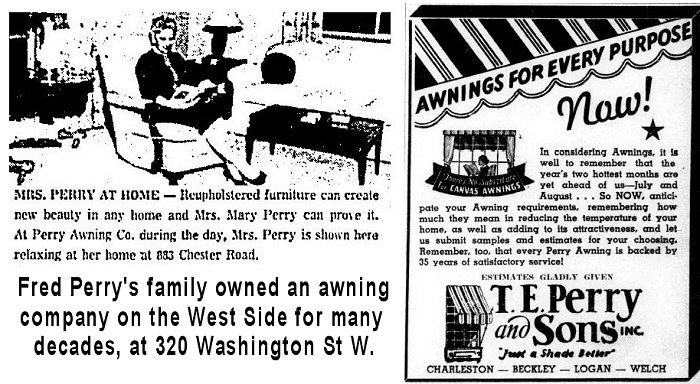
Fred Perry was the most famous gambler in his
day, with stories appearing
all over the U.S. in major
newspapers, like this one from the L.A. Times.
|
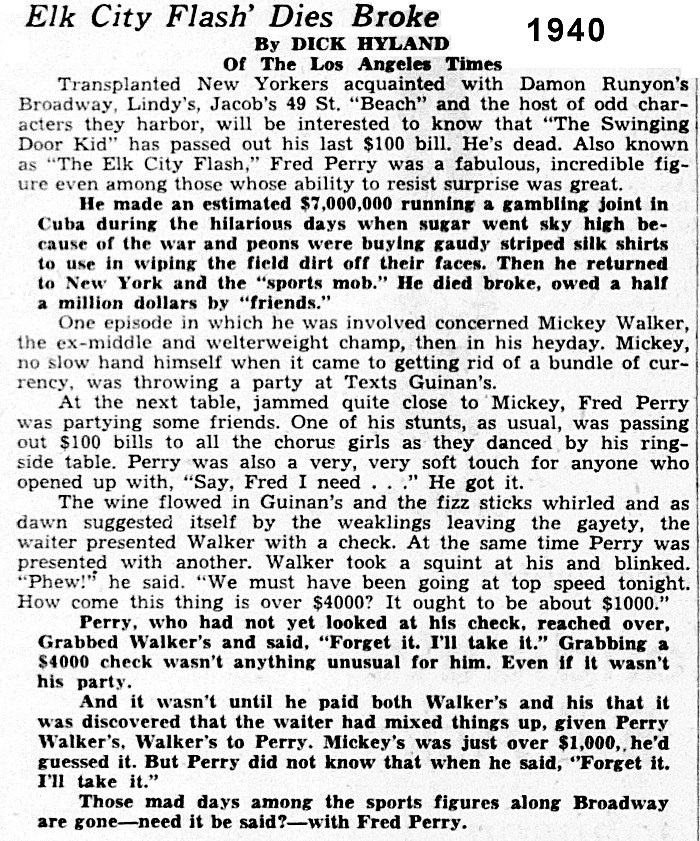
Amazing isn't
it? And yet no one remembers the "Elk City Flash". Well, I
am here to correct that and give you the story that nobody today
knows....
Fred Perry was born on the West Side in 1886, and lived at 115 Fayette
St, now Lee Street W. just before he left home in 1905. Below you
will read of his exploits, including his stint at the White Sulphur
Springs Resort....
|
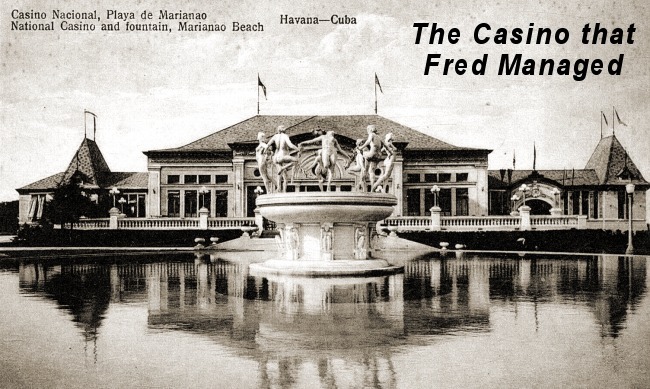
The following is a chapter on Fred
Perry's life from the book
"When it's Cocktail Time
In Cuba"
|

Fred Perry is a "square
gambler."
Charleston, W. Va., 1889. A frame house of some pretension, painted
white. A God-fearing man of gentle features paces anxiously the porch.
Suddenly he halts; sweat breaks out on his forehead; there is a faint —
becoming lusty — cry from within. A woman hurries out and beckons,
speaking softly:
"It's a boy."
1900.... Another house but the same gentle-faced man speaking
to his small son.
"Boy, you are to be raised for the Church, to follow the vocation of
your father. It may be that when you are older you will not feel the
Call. In that case you will go your own way in life, remembering the
stock you spring from. You'll remember that your grandfather was
Colonel Flintlock Perry, a hero of the war. You'll remember also that
your father was a gentleman, and that you must always be a gentleman,
in whatever paths your life may lead you.
"A gentleman, Fred, means honor, trustworthiness, decency, charity.
Never forget that."
Fred Perry never has. He never "felt the Call" and never entered the
Church, but if he failed in this ambition of his father's the testimony
is overwhelming that he has planned his life according to the other.
"How in the world," I said, "did you ever become a gambler—raised in
that atmosphere?"
Perry was meditative.
"Well," he said, "I guess it just had to be, that's all. I must have
been a throw-back to old Flintlock Perry, who was some lad if all I can
gather is true. Gambling fascinated me the more because it was so
strictly condemned in my home.
"Why, my home was the strictest you can imagine. My mother wouldn't
allow a card or a drop of alcohol to cross the doorstep. One day she
was failing and the doctor prescribed malt beer. She was horrified. She
said she would rather die than touch a drop.
"My father regarded drinking and card-playing in the same light as
murder, adultery, or the other deadly sins. That's why it happened, I
guess. It's an old story. Being forbidden certain things, I set out to
find out why they were forbidden, and found I liked them."
Perry hesitated a moment. Then he said: "I think if father had known
these things himself his attitude towards them would have been
different. Playing cards can't be a sin, because it isn't dishonest in
itself, it's just your skill against someone else's, your luck against
his. All life's that, if you really come down to it. The principles of
life are the same that a fellow goes up against at poker or craps.
"And I've known men in the gambling business who were just as
honorable, to their way of looking at it, as my father was in his own
view. None of the gamblers I played around with for years would take
money from a man if they knew he needed it. Lots of times I've seen
them give it back to a man when they found out he'd a wife and kids at
home."
"Perry," I said, "when did you start to gamble?"
The fair-headed, smooth-cheeked man thought a moment.
"Well," he said, "it wasn't in the Epworth League— ( the Epworth League
is a Methodist young adult association) though there was a kid there
who—but we needn't go into that. I think the first time I ever
saw a gambling game was when I was a page in the State legislature. The
pages used to shoot craps behind the scenes. "I liked to be
thought a 'good sport' in those days, and I got to be a pretty good
crap shooter. Then I started playing pool — and father found out."
"That was the beginning?" I said, gently.
"Yes. There was a row, and I left home when I was nineteen. Went to the
Jamestown Fair with a fellow. Carl—he was my pal—and I were both pretty
fair with a cue and we drifted from place to place making our living in
the pool-rooms. Then we met a civil engineer who offered us a job over
in Joplin, Missouri. That was my first real trip away from home. I'd
never even been inside a theater until then.
"Over in Joplin, which was a pretty wild town, there was an old man
with a white beard named Hanley. He was a professional poker player. He
saw the way I was drifting and tried to get me to go home. But I
wouldn't. I was willful—and scared.
" 'Well, boy, if you will be a gambler you'd better be a good one,' old
man Hanley told me. And he taught me the tricks of the trade.
"Hanley was the one who taught me to respect the viewpoint of the other
man. Always to look behind the words of a man, and not go butting in
with my own half-baked ideas. He said the first thing a gambler had to
be was square, because if he wasn't he'd be shot, sooner or later."
Perry, first with one pal and then with another, drifted around the
Middle West and finally "made a killing" which brought him East again.
He and a gambler named Eddie Young became great friends. Eddie was from
his part of the country.
"A good deal of what I know about human nature I learned from the
gaming tables," said Perry, "and most of what I know about gambling I
learned first from Old Man Hanley and secondly from Eddie Young."
He looked up from where we were sitting in the Casino and, seeing a man
passing, called to him.
"Oh, Eddie!" he said. When the man, short, stockist, with clear,
quizzical eyes, came, he introduced us.
"Sit down, Eddie," he said. "Eddie, I want to see you two meet. . . .
This is Eddie Young of West Virginia, my best pal and my right-hand
man."
Mr. Young and I shook hands.
"Eddie," resumed Perry, "this gentleman wants to write about gambling
and gamblers. Do you think we should let him, Eddie?"
Mr. Young was deliberate. "Wa-al, now," he said, finally, "I don't know
why he shouldn't. Gambling's a business, just like any other. It's a
tolerable clean business, too, nowadays. As clean as any I know of."
"Not only clean, Eddie," said his chief, "but it's the only business in
the world that's got to be clean. If we tried tactics here that some
businesses they claim are 'honest' do we'd be out of business in a
week."
Mr. Young nodded. "That's whatever," he said.
"To get back to the subject," I said, "what happened after you had
become a full-fledged gambler?"
"Oh—I don't know. Just drifted around. Ran a place here and there.
Worked awhile in New York. Got to be quite a boy at golf."
"Golf!" I said.
"Yea, golf!" repeated Perry. "America's greatest gambling game after
poker—and Wall Street, of course."
"He was an amateur champion golfer once," said Mr. Young, with a grin.
"Eddie here thinks it's funny," Perry explained. "Gamblers didn't use
to golf much in those days."
After "driftin' around"
Perry became manager of the club at White Sulphur Springs, West
Virginia.
There he made his
reputation, and it was there that Messrs. Bowman and Flynn found him
and appealed to him to come and
run their casino.
"It's a nice little show," said Perry, "and I've got a fine bunch of
boys working for me—starting with Eddie here." "The boys would go
to hell for him," said Eddie, aside.
I found that this was literally true. Perry has collected dealers and
croupiers from all the reputable houses in the States,* men whose
reputations he knows. Many of them are gray-haired, veterans of the old
open days of California and the Territories. Some worked for Tex
Rickard in the old Concordia Club; others were dealing faro in Tucson
and Phoenix when the Forty-eighth State, puffed up in brand-new
statehood, prohibited public gambling. Men like Holladay, Billy
Stewart, Barton, Barry, Andy Ginter, Cap'n McKeen of Texas, Frank Jones.
"See that little fellow there?" asked Perry, pointing to a small man
whose manner of walking denoted the horseman, and whose frank smile and
courteous ways I had noticed before. "That's one of America's best
amateur polo players, Herbert Wynn. He's not a rich man, though, and
you have to be rich to play polo. So now he's one of my right-hand
men." He called to Mr. Wynn.
"Herbert," he said, "I was just telling this gentleman about you. He's
going to put us in a book. Do you mind?"
* I asked Perry how many "reputable" gambling houses there were. "In
the entire United States," he said, "there are not more than five
places worth a good gambler's time."
"If I was ashamed of my job I wouldn't be working here," said Mr. Wynn,
easily. "This is as good as any other job—as good as selling bonds,
anyway."
"And as hard," put in Mr. Young.
"Is it really hard work?" I asked. I had always heard gamblers referred
to as "soft-fingered idlers."
"So hard," said Perry, "that an hour at a time is a long time for a
dealer to deal without relief. Short of stoking a battleship—and that
shift's two hours— I don't know anything so hard as that."
"A dealer has to be wide awake every minute," explained Young. "It may
look easy, but a good dealer is so fast that it takes a lightning
calculator to keep up with him. And he can't make mistakes. If he does,
the house pays for them many times over. Making mistakes at dealing is
often worse than being downright crooked."
After watching some of the dealers awhile, seeing how deftly they
estimated the number of chips in front of you without counting them,
noting how they made change and paid winning bets without an error, I
was inclined to agree with him.
Young took me to a table and gave me a number of chips.
"Stack 'em up on the hazard table over there and ask Joe how many
you've got," he suggested.
I did so. Joe glanced at the stacks with a casual eye.
"One hundred and sixteen dollars, sir," he said. "Will you take cash?"
Eddie smiled. "Count 'em," he urged. I counted. One hundred and sixteen
dollars!
A man walked into Perry's office in the Casino. He wanted to cash a
check for two thousand dollars.
His name meant nothing to Perry. He offered his card—with a small
middle-western town as address.
"Stranger," said Perry, "if I walked into your place of business at
home and asked you to cash a check for $2,000 when you didn't know me,
would you do it?"
The stranger stammered, cleared his throat, finally thought he would.
"You wouldn't," said Perry. "Here's what I'll do. I'll gamble with you.
Make this check for a thousand and I'll take a chance."
Another man walked into the office, in a towering rage.
"What's this hundred-dollar limit stuff?" he sneered. "Say, this is a
cheap joint!"
Without a word Perry fished out a coin from his vest pocket.
"So you want a gamble, do you?" he said. "Well, in the game you were
playing, there's five percent for the house. I'll tell you what I'll
do. We'll toss this coin and you can call it heads or tails. Or you can
toss one of your own coins. And make it any limit you want. How much is
it? Five—ten—fifty thousand? I'm right here to accommodate—and no
percentage."
The man grinned sheepishly and withdrew.
Sitting with me over supper, Perry watched a woman enter the gaming
rooms. He looked a little disgusted.
"Back again!" he said. "Wait a moment." He called an assistant. "Bill,
that lady is not to play," he said. Then, to me: "We have two of her
checks from last year. She can't afford to play. She only has a small
income and it goes in a night at the tables. We don't want that kind of
money here."
On another occasion, when a certain big gambler from New York objected
to a croupier's rapidity, Perry took him into the private room and
showed him a roulette wheel, a hazard-board and other games. "Name your
limit," he said, "and I'll deal for you myself—and no percentage.
Anything you like up to a million. Or, if you prefer, you can deal, and
I'll play."
A famous humorist lay on his back in a hospital. The appendicitis
operation hadn't quite succeeded. There had been complications.
"Haven't been able to work for three months, Fred," he said. "Tough on
the wife."
An hour later the wife returned and saw a slip of paper on the bed. She
read it, and blanched.
"Fred Perry's been here!" said her husband. "I know," she said. "He
left this. We got to send it back." It was a check for ten thousand
dollars.
I asked a man in business in Havana about Perry. Never have I seen
worship so absolutely flood a man's face.
"Listen," he said, "I'd go to hell for that guy, see? You know when I
started this place I didn't have much capital and what with one thing
and another things didn't look too good. Sugar had crashed and nobody
was spending. "Then the wife took sick, and after that I had to get
sick too. All my savings looked like being swept away. It certainly
seemed my finish.
"Then one night I met this man Perry. 'Hello, George,' he said. He'd
known me in New York— not well, as a friend—only casually. 'Hello,
Fred,' says I. That was all. But he must have seen by my manner that I
was in a hole. Next day he comes to my place and looks me straight in
my face.
"'George, you damn' fool,' he says, 'why didn't you put me wise? How
much do you need?' I tried to protest. 'George,' he continues, 'I could
poke you a swift one, you're so dumb! How much do you need?'
"Well, the long and the short of it is that Fred Perry pulled me out of
a damn' tight hole. You couldn't say 'no' to him. 'Shucks,' he'd say,
'what do you think it's good for, anyway?' That's how he thinks of
money. Something to help out his pals with. And I wasn't even a real
pal."
A night club in New York. A bit of "fluff" is "giving her line" to the
"boy from the sticks," the "free-handed spender."
Fred Perry looked at her with a smile.
"Sister," he said, "you tell me that you've got a dying mother, a
crippled sister, and a brother in jail, not to speak of the younger
brother you're puttin' through school." "It's true, Fred," said the
girl, her voice quavering professionally. "It's true, so help me—"
"Gosh, girl," said the tall man, "I'm not asking you if it's true or
not. You tell it—that's good enough."
The man who told me that story, one of New York's best-known sporting
writers, said that an hour or two later they found the girl all alone
in a corner, weeping over a thousand-dollar bill. "C'n you beat it?"
said the sport-scribe. "She wanted to give it back! Said he was too
decent a guy to bilk."
I taxed Perry with these and other crimes and he merely smiled, his
blue eyes looking into mine humorously.
"Just put me down as a damn' fool and you'll have said it," he said.
It was like the man not to try to deny the tales. A less honest man
would have done so, or pretended to.
When it comes right down to it I don't know of any man whose hand I'd
rather shake, whom I'd rather call friend, than "the Elk City
Flash"—Fred Perry, gambler.
|
Just a few of
the hundreds of articles on The Elk City Flash

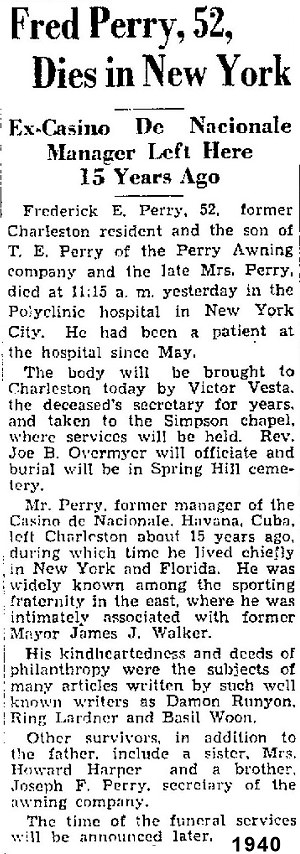
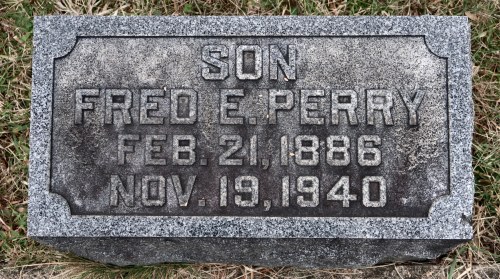
SEE MORE ARTICLES ON FRED PERRY HERE
AND NOW ABOUT HIS GRANDFATHER "FLINTLOCK" PERRY
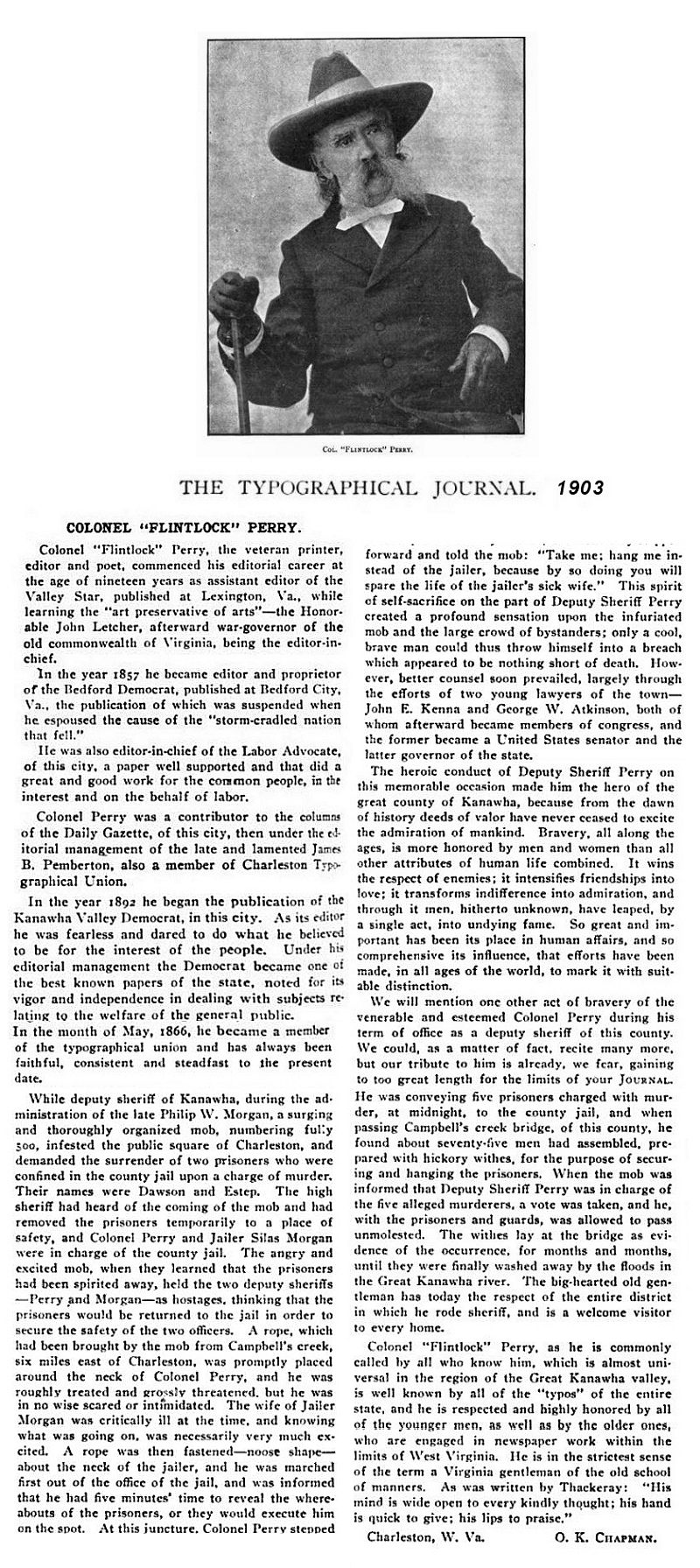
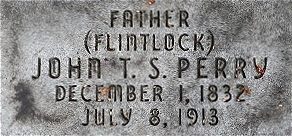
Back
|













